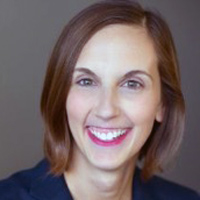Pessimists Never Prosper: Try an Abundance Mindset Instead
Even if you're a perpetual pessimist, there are ways to channel your thinking into a more positive direction, and that can help reap benefits for yourself, and for society in general.


Profit and prosper with the best of Kiplinger's advice on investing, taxes, retirement, personal finance and much more. Delivered daily. Enter your email in the box and click Sign Me Up.
You are now subscribed
Your newsletter sign-up was successful
Want to add more newsletters?

Delivered daily
Kiplinger Today
Profit and prosper with the best of Kiplinger's advice on investing, taxes, retirement, personal finance and much more delivered daily. Smart money moves start here.

Sent five days a week
Kiplinger A Step Ahead
Get practical help to make better financial decisions in your everyday life, from spending to savings on top deals.

Delivered daily
Kiplinger Closing Bell
Get today's biggest financial and investing headlines delivered to your inbox every day the U.S. stock market is open.

Sent twice a week
Kiplinger Adviser Intel
Financial pros across the country share best practices and fresh tactics to preserve and grow your wealth.

Delivered weekly
Kiplinger Tax Tips
Trim your federal and state tax bills with practical tax-planning and tax-cutting strategies.

Sent twice a week
Kiplinger Retirement Tips
Your twice-a-week guide to planning and enjoying a financially secure and richly rewarding retirement

Sent bimonthly.
Kiplinger Adviser Angle
Insights for advisers, wealth managers and other financial professionals.

Sent twice a week
Kiplinger Investing Weekly
Your twice-a-week roundup of promising stocks, funds, companies and industries you should consider, ones you should avoid, and why.

Sent weekly for six weeks
Kiplinger Invest for Retirement
Your step-by-step six-part series on how to invest for retirement, from devising a successful strategy to exactly which investments to choose.
Are you a glass-half-full or glass-half-empty kind of person?
When you think about the future, do you see limitless opportunities or multiple barriers? Do you get excited about international travel and interaction with other cultures, or do you think it’s a shame “all our U.S. jobs are going overseas”?
Be honest. Depending on your response, you either have an abundance or scarcity mindset. If you answered affirmatively to the first half of each question (i.e., glass-half-full, limitless opportunities, and excitement), you likely have an abundance mindset. Congratulations! An abundance mindset accelerates personal growth in unimaginable ways. BUT not everyone is like you.
From just $107.88 $24.99 for Kiplinger Personal Finance
Become a smarter, better informed investor. Subscribe from just $107.88 $24.99, plus get up to 4 Special Issues

Sign up for Kiplinger’s Free Newsletters
Profit and prosper with the best of expert advice on investing, taxes, retirement, personal finance and more - straight to your e-mail.
Profit and prosper with the best of expert advice - straight to your e-mail.
If you answered affirmatively to the second half of each question (i.e., glass-half-empty, multiple barriers, shameful globalization), you are probably operating under the scarcity mindset. You may be concerned that there is never enough and may feel like a victim. This article is intended for you! We’ll answer three critical questions:
- What is an abundance mindset?
- Why is it important?
- Can you change your mindset?
What is an abundance mindset?
Steven Covey’s 1989 bestseller, The Seven Habits of Highly Effective People, coined the term “abundance mentality.” An abundance mindset helps you:
- Create meaningful life experiences.
- Pursue new, interesting opportunities.
- Live a full and satisfying life.
- Find happiness even amid struggle.
- Feel inspired and creative.
People with an abundance mindset see the potential to move beyond present circumstances and have hope in a brighter future. They feel empowered, rather than frustrated and overwhelmed.
Why is an abundance mindset important?
True transformation requires an abundance mindset. As faith believers, we are called to transformation, not tweaking. One of my favorite writers is Matthew Kelly of Dynamic Catholic. Each book Matthew publishes is short but impactful. He takes a 2,700 year-old-text (the Bible) and simplifies it into powerful, digestible messages.
Matthew Kelly was the first person to help me make a connection between the abundance mindset and a spiritual focus on becoming the best version of myself. When you try to become a better version of yourself daily, you can’t help but be excited about what tomorrow holds. You think about today’s mistakes but don’t dwell on them. You treat stumbling blocks as learning experiences and move on.
An abundance mindset aids you personally and also accelerates growth on many other levels. Men become better fathers, husbands and sons. Women become better mothers, wives and daughters. Your family may notice a positive difference in you, and it might just shape their perspective on life. In the workplace, you’ll be focused and driven but will also keep your priorities aligned.
Once your family and workplace have benefitted from the “new” you, you’ll probably think about how you can use your gifts to help others in your community (or the broader world). An abundance mindset is freeing, and it’s where transformation begins.
Can mindset be changed?
The short answer is YES! The Chopra Center offers several suggestions to move into an abundance mentality, including:
- Become aware of your thoughts through mindfulness. Notice the types of thoughts circulating through your head, and make a conscious effort to shift toward abundance.
- Practice gratitude. Keep a gratitude journal, recording at least 10 items daily.
- Recognize the unlimited possibilities. Focus can be incredibly powerful but also unhelpful if your focus is too narrow and you fail to notice other possibilities.
- Cultivate and share your passions and purpose. Serve others by sharing your unique gifts and providing value.
- Think about what is going right. Human brains are wired to notice the bad more easily than the good. Take a holistic approach and play to your strengths.
We have the highest living standards of any generation in history. Our World in Data shows how global living conditions are changing. Poverty, illiteracy and childhood mortality rates have dropped significantly since 1950. Political freedoms stemming from democracy and postsecondary education rates have soared.
Yet 90% of people think the world isn’t getting better, according to Our World in Data. The news often focuses on bad events, such as terrorist attacks, natural disasters and mass shootings. It’s quite rare to see any news channel spend more than five minutes of a 30-minute show on “feel good” segments. We don’t get to see our everyday heroes on TV or in the newspapers; police officers, firefighters, teachers and missionaries make the headlines for conflict and controversy, not when things are business as usual.
Despite the good work happening in our neighborhoods and communities worldwide, 1 in 10 people today still live in extreme poverty. To solve big problems like poverty, we need to stop living in isolation and collaborate. Get behind a cause and garner support from others who are interested in advancing the same social change.
When you operate from a place of abundance, it means you are open to new opportunities. Any prior mistakes can be acknowledged and treated as a learning experience. Remember that your past isn’t a script for your future.
Profit and prosper with the best of Kiplinger's advice on investing, taxes, retirement, personal finance and much more. Delivered daily. Enter your email in the box and click Sign Me Up.

Deborah L. Meyer, CFP®, CPA/PFS, CEPA and AFCPE® Member, is the award-winning author of Redefining Family Wealth: A Parent’s Guide to Purposeful Living. Deb is the CEO of WorthyNest®, a fee-only, fiduciary wealth management firm that helps Christian parents and Christian entrepreneurs across the U.S. integrate faith and family into financial decision-making. She also provides accounting, exit planning and tax strategies to family-owned businesses through SV CPA Services.
-
 Quiz: Do You Know How to Avoid the "Medigap Trap?"
Quiz: Do You Know How to Avoid the "Medigap Trap?"Quiz Test your basic knowledge of the "Medigap Trap" in our quick quiz.
-
 5 Top Tax-Efficient Mutual Funds for Smarter Investing
5 Top Tax-Efficient Mutual Funds for Smarter InvestingMutual funds are many things, but "tax-friendly" usually isn't one of them. These are the exceptions.
-
 AI Sparks Existential Crisis for Software Stocks
AI Sparks Existential Crisis for Software StocksThe Kiplinger Letter Fears that SaaS subscription software could be rendered obsolete by artificial intelligence make investors jittery.
-
 Social Security Break-Even Math Is Helpful, But Don't Let It Dictate When You'll File
Social Security Break-Even Math Is Helpful, But Don't Let It Dictate When You'll FileYour Social Security break-even age tells you how long you'd need to live for delaying to pay off, but shouldn't be the sole basis for deciding when to claim.
-
 I'm an Opportunity Zone Pro: This Is How to Deliver Roth-Like Tax-Free Growth (Without Contribution Limits)
I'm an Opportunity Zone Pro: This Is How to Deliver Roth-Like Tax-Free Growth (Without Contribution Limits)Investors who combine Roth IRAs, the gold standard of tax-free savings, with qualified opportunity funds could enjoy decades of tax-free growth.
-
 One of the Most Powerful Wealth-Building Moves a Woman Can Make: A Midcareer Pivot
One of the Most Powerful Wealth-Building Moves a Woman Can Make: A Midcareer PivotIf it feels like you can't sustain what you're doing for the next 20 years, it's time for an honest look at what's draining you and what energizes you.
-
 I'm a Wealth Adviser Obsessed With Mahjong: Here Are 8 Ways It Can Teach Us How to Manage Our Money
I'm a Wealth Adviser Obsessed With Mahjong: Here Are 8 Ways It Can Teach Us How to Manage Our MoneyThis increasingly popular Chinese game can teach us not only how to help manage our money but also how important it is to connect with other people.
-
 Looking for a Financial Book That Won't Put Your Young Adult to Sleep? This One Makes 'Cents'
Looking for a Financial Book That Won't Put Your Young Adult to Sleep? This One Makes 'Cents'"Wealth Your Way" by Cosmo DeStefano offers a highly accessible guide for young adults and their parents on building wealth through simple, consistent habits.
-
 Global Uncertainty Has Investors Running Scared: This Is How Advisers Can Reassure Them
Global Uncertainty Has Investors Running Scared: This Is How Advisers Can Reassure ThemHow can advisers reassure clients nervous about their plans in an increasingly complex and rapidly changing world? This conversational framework provides the key.
-
 I'm a Real Estate Investing Pro: This Is How to Use 1031 Exchanges to Scale Up Your Real Estate Empire
I'm a Real Estate Investing Pro: This Is How to Use 1031 Exchanges to Scale Up Your Real Estate EmpireSmall rental properties can be excellent investments, but you can use 1031 exchanges to transition to commercial real estate for bigger wealth-building.
-
 Should You Jump on the Roth Conversion Bandwagon? A Financial Adviser Weighs In
Should You Jump on the Roth Conversion Bandwagon? A Financial Adviser Weighs InRoth conversions are all the rage, but what works well for one household can cause financial strain for another. This is what you should consider before moving ahead.